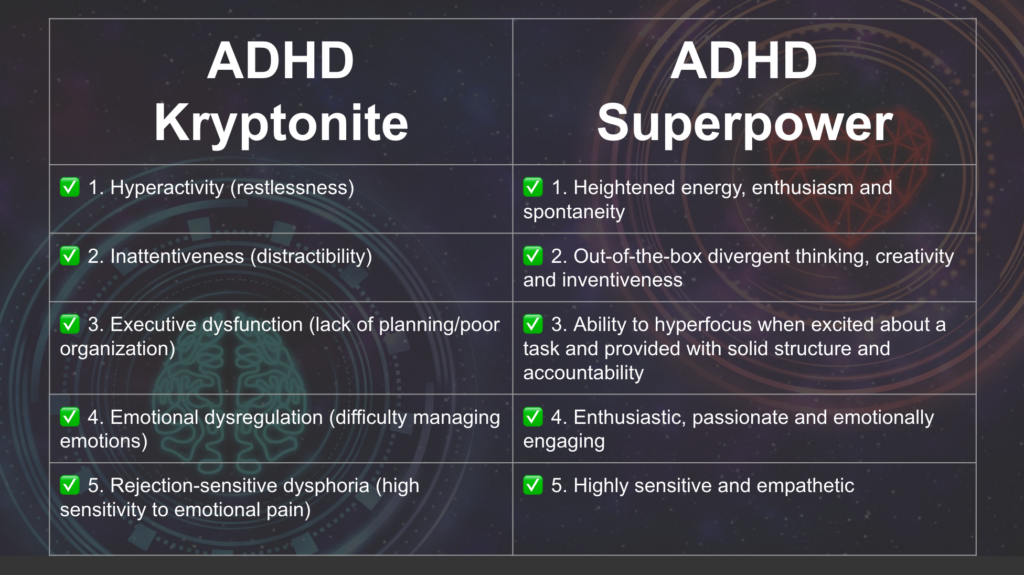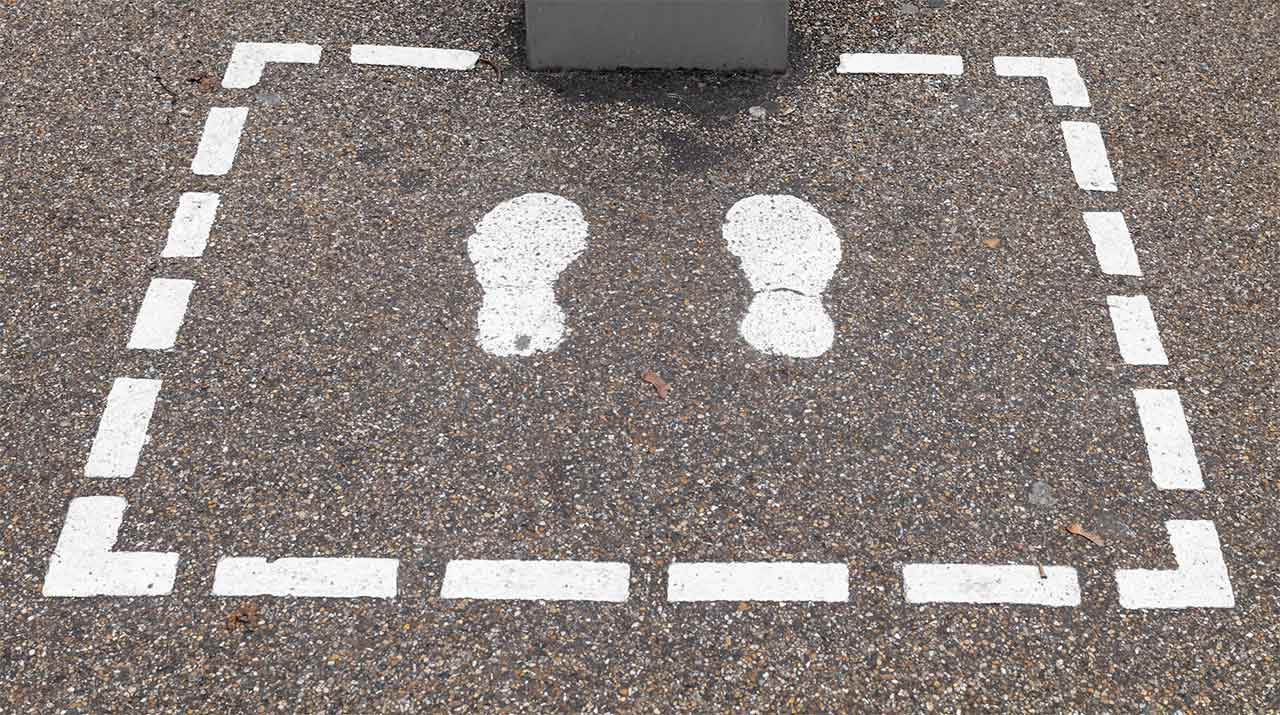Let’s face it, ADHD is a paradoxical condition, which makes it both a strength and a weakness for entrepreneurs.
ADHD is notoriously hard to nail down. It’s frustrating. It’s confusing. It changes based on how much sleep you get and the level of stress you’re under.
It’s a little bit different in everyone who experiences it and it simply doesn’t fit in cozy little box of classification that the neurotypical medical system obsesses over.
But there are some common challenges and neurological differences that I have seen among highly creative people with ADHD who start and run successful businesses.
Their ADHD is both their superpower that intrinsically drives them to solve a problem in the world but also their kryptonite that sends them off into too many different directions chasing shiny object and cheap dopamine that can regularly lead to mini ADHD burnouts.
Each ADHD Superpower Has Its Kryptonite

Paradoxically, our greatest gifts can sometimes feel like our greatest curses without the right environment, routines and accountability systems.
My favourite description of the innate creative spirit and entrepreneurial traits common among people with ADHD comes from Ned Hallowell,
“People with ADHD have a Ferrari for a brain, but they have bicycle brakes. Strengthen the breaks and you have incredible power. People with ADHD are creative and imaginative. They’re the people who colonized this country. They are visionaries, pioneers, dreamers, and risk-takers. It’s an edge.”
Here’s how the 5 typical symptoms and cognitive differences characteristic of highly creative people with ADHD and how they can be both a weakness and strength:
1. Hyperactivity causes restlessness.
Hyperactivity makes it hard to sit still and finish projects to completion, especially after the most challenging and interesting parts are done.
On the flipside, hyperactivity leads to the heightened energy, enthusiasm and spontaneity that makes entrepreneurs with ADHD highly passionate and engaging leaders that people want to listen to and be around.
The key to making hyperactivity a superpower is surrounding yourself with a peer group that supports you, understands your ADHD and keep you accountable to your goals.
2. Inattentiveness causes distractibility.
Distractibility can easily hijack the ADHD mind. That’s why you have to systemically remove cheap sources of dopamine from your work environment like social media, the news and all distracting apps.
On the flipside, distractibility makes ADHD entrepreneurs highly curious and that gives them a knack for out-of-the-box divergent thinking, creativity and inventiveness.
It’s just a matter of focusing all that curiosity on the passions, talents and problems that you want to master to build your business long-term.
3. Executive dysfunction causes lack of planning and poor organization.
Executive dysfunction may be the defining characteristic of ADHD. You know exactly what you do but you struggle to consistently do it.
On the flipside, when there are high consequences you have an exceptional ability to hyperfocus and get into flow states, especially when you are excited about a task and provided with solid structure and accountability.
The key here is a routines, social groups and accountability that forces you to take action and be held to a high standard of integrity that forces you to consistently level up.
4. Emotional dysregulation makes it difficult to manage painful emotions.
Emotional dysregulation makes people with ADHD highly emotionally sensitive. We can easily get fixated on mistakes, failures and the painful emotions that result in an constant story narrative spinning around in our head.
On the flipside, our highly sensitive nature makes us enthusiastic, passionate and emotionally engaging.
If you’re on the entrepreneurial rollercoaster with ADHD then it’s important to have mental health practices like meditation, mindful nature immersion and daily exercise to help you process, understand and let go of painful emotions.
5. Rejection-sensitive dysphoria makes us highly sensitivity to rejection.
Rejection-sensitive dysphoria (RSD) makes us suppress and avoid negative emotions because we hate the feeling of failure and rejection. This can make us constantly shift focus by pivoting to something different when things go badly (often before we’ve fully tested a business strategy or tactic).
On the flipside, our difficulties and struggles in life have made us highly sensitive and empathetic individuals, which are crucial skills for understanding problems, finding product-market fit and becoming a great salesperson.
The key to dealing with rejection-sensitive dysphoria is surrounding yourself with other ADHD entrepreneurs in an inner circle or mastermind group where you can feeling express your inner struggles and get advice from likeminded people. As social animals, our community is our advantage when it comes to resilience.
Building An ADHD Friendly Business
An ADHD friendly business involves having a simple business model and offer to the marketplace that aligns passion, purpose and profit.
It also involves building structure, routines, accountability, as well as environmental and social supports from other ADHD entrepreneurs, mentors and leaders you respect.
With the right combination personalized for your unique needs, ADHD can be a superpower for entrepreneurship.
- 10 Tips, Tricks And Tools To Overcome ADHD Paralysis - March 19, 2025
- 10 Interesting Facts About Adult ADHD And Mental Health - March 18, 2025
- 15 Ways To Manage ADHD Without Meds By Biohacking Dopamine - February 14, 2025




